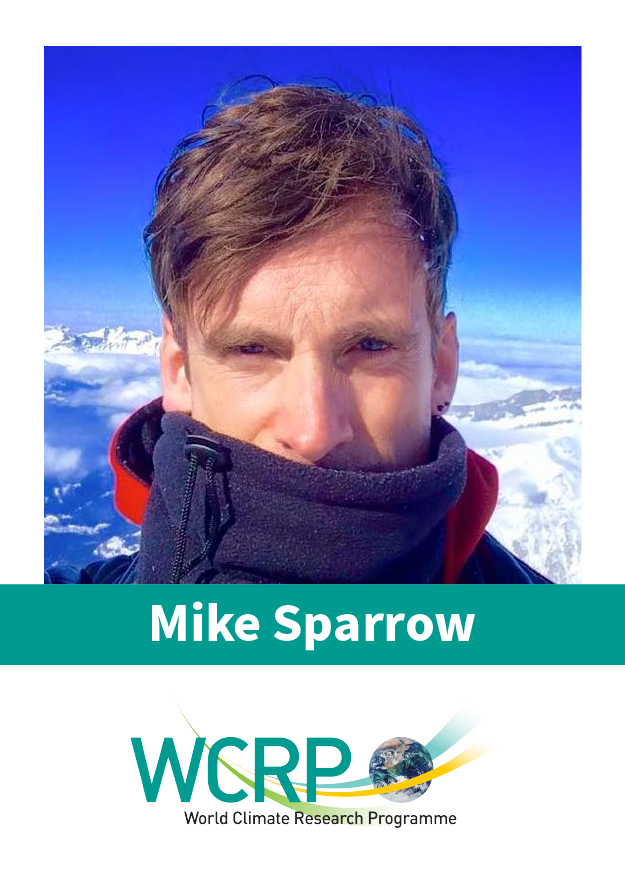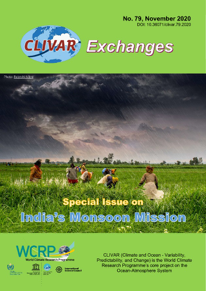First session of the 28th SPARC SSG meeting
On Wednesday, 18 November, the first session of the 28th SPARC SSG meeting was held online. In a three-hour discussion session the SSG members and Activity leads discussed the future direction of SPARC. The discussion was based on an interim report from the SPARC Strategy Task team, led by Amanda Maycock, that has worked to review SPARC’s current structure and discuss important science topics to focus on in the future. Ideas, recommendations, and open issues are taken forward to the WCRP JSC by the co-chairs in this week’s extraordinary session of the JSC.
Discussions with the SPARC community will continue via email or further online meetings. A more detailed report on the SSG session will be published in the January SPARC newsletter.
The online SSG meeting will have another session reserved for activity reporting and SSG business. This session is planned to take place in January or February.
SPARC General Assembly 2022
We are starting to plan for the SPARC General Assembly which is due to be held in 2022. In line with the SPARC goal to reduce our climate footprint, we want to organise it in as environmentally friendly way as possible while meeting the aim of a General Assembly to be a community-building event. We are therefore looking for innovative ways* to hold the conference. Andrew Charlton-Perez has kindly agreed to chair the planning group discussing ways in which this could be achieved.
We want to recruit volunteers interested in brainstorming ideas for the SPARC GA. Please contact the SPARC Office or Andrew, if you would like to contribute or pass this on to anyone you think might be interested. We hope that scientists with varied backgrounds and levels of experience will contribute. We are looking for outline proposals to be prepared this autumn.
The experience of holding on-line conferences is being greatly accelerated as part of the response to the Covid-19 pandemic. We want to learn all we can from this experience. If you have experienced or are aware of examples of holding on-line meetings, please do contact us with what you think worked well, did not work, and the lessons learned. Please visit the SPARC webpage to let us know about your experience.
* e.g as described in SPARC newsletter No. 54 or by
Klöwer, M. et al., 2020: An analysis of ways to decarbonize conference travel after COVID-19, nature 583
A small group that participated in the SPARC workshop in Madrid have written down their thoughts on how the community could reduce its ecological footprint. These thoughts should be seen as a starting point for discussions, but also for taking action in the SPARC community and beyond. The article particularly addresses workshop organisers and provides some ideas what they should consider when setting up their meeting to reduce the carbon footprint. - An outline of actions of WCRP as a whole will be printed in the upcoming SPARC newsletter.
We look forward to receiving more ideas from the community and insights from future workshop experi-ences. This shall lead to a binding guideline for setting up SPARC meetings in the future.
Find questionnaire
Obviously, this cannot be an exact science, but it would really be helpful, if you take the time to fill in the attached questionnaire for any SPARC workshop/meeting/training school/… you have organised in the recent past (one questionnaire per meeting).
Please note, that this is voluntary, and the purpose is to get a broad idea of our meeting carbon footprint. We know, that any numbers provided cannot not be precise; a sound estimate is fine. We acknowledge that SPARC workshops and meetings vary in size, time, and location.
As the ongoingpandemic of Covid-19 hits every part of the world, we want to continue to
1. Offer our help. Please don’t hesitate to contact the SPARC office about things you would like assistance with, or want to share with the community.
2. Ask how you to share your experience with online meeting formats you have seen in the past months?
3. Hear what you think we could do to help your SPARC work.
We are looking forward to hearing about your experience – we will do our best to help you keep up your great work. It will be valuable in helping SPARC plan its future activities as we move to an era with reduced carbon footprint.
Stay healthy!
The SPARC co-chairs and office team
The 'new' WCRP will soft launch in 2021
In December 2019, WCRP launched its new Strategic Plan. Throughout this year, the community has been discussing how the plan can be implemented to deliver a new WCRP that is ready to tackle the challenges and take advantage of the opportunities of climate science in the next decade. This will involve simplifying the WCRP structure and launching a number of ambitious new activities. The details of a 'soft implementation' of the new WCRP will be decided at the Extraordinary Session of the WCRP Joint Scientific Committee (30 Nov — 3 Dec 2020). Find out more about what to expect here:
The 'new' WCRP will soft launch in 2021. What to expect?
WCRP is happy to welcome two new JSC members. Both Maria Ivanova and Roberto Sánchez Rodríguez come from a social sciences background and will bring unique and important perspectives to WCRP.
Maria Ivanova is an Associate Professor of Global Governance and Director of the Center for Governance and Sustainability at the John W McCormack Graduate School of Policy and Global Studies at the University of Massachusetts Boston, US. To know more about Maria Ivanova, click here.
Roberto Sánchez Rodríguez is a Professor at the Department of Urban and Environmental Studies at El Colegio de la Frontera Norte, Mexico. To know more about Roberto Sánchez Rodríguez, click here.
Dr. M ike Sparrow has been appointed as Head of the WCRP Secretariat and Head of the World Climate Research Division, Science and Innovation Department, WMO.
ike Sparrow has been appointed as Head of the WCRP Secretariat and Head of the World Climate Research Division, Science and Innovation Department, WMO.
He says, "This is an exciting and challenging time for WCRP. The next few years will bring challenges that can only be addressed through worldwide cooperation and coordination on a number of important issues. Reliable and informative climate science is needed more than ever and WCRP is crucial to this endeavor. I look forward to working with WCRP's Joint Scientific Committee, our co-sponsors, and the many dedicated scientists that are the foundation of our work."
Congratulations to Mike on his appointment.
Two new job openings are available in the WCRP Secretariat:
- Science Officer (P3) : To know more, click here
Deadline for application : 23 December 2020
- Science and Communications Officer (P3): To know more, click here
Deadline for application: 22 December 2020
For questions or additional queries please contact msparrow@wmo.int
New data set available: solar forcing recommendations for the planned CCMI experiments in support of the 2022 Scientific Assessment of Ozone Depletion
SOLARIS-HEPPA generated and made available the solar forcing recommendations for the planned CCMI experiments in support of the 2022 Scientific Assessment of Ozone Depletion (CCMI-2020).
The solar forcing data is an extension of the historical CMIP6 forcing dataset (extended until end of 2019) and can be found here: https://solarisheppa.geomar.de/solarisheppa/ccmi2022
Registration open: EUMETSAT online short courses on weather, oceanography, air quality and climate
This September the training team at EUMETSAT has kicked off a series of online short courses that will cover weather, oceanography, air quality and climate. Short courses will be offered September through December.
The short courses are open to all interested participants and address a wide range of attendees, from service providers to young (and less young) scientists and forecasters.
More information about the online series and the course schedule is available on Moodle EXT, the EUMETSAT training platform at https://training.eumetsat.int/course/index.php?categoryid=97 EXT. Here participants can find information about the content and format of the sessions, and they can already register their interest EXT in the courses.
Each short course will offer a webinar with a presentation, a demonstration of data discovery and data application. Some courses will also include a follow-up self-paced phase where participants will have the opportunity to further explore the data and discuss it with experts.
Announcement: Special Sections in GRL: “The Exceptional Arctic Stratospheric Polar Vortex in 2019/2020: Causes and Consequences
Dear Colleagues,
We would like to draw your attention to a new Special Section in Geophysical Research Letters and Journal of Geophysical Research: Atmospheres entitled “The Exceptional Arctic Stratospheric Polar Vortex in 2019/2020: Causes and Consequences”. The call for papers for this Special Section and submission information are given below.
We encourage you to consider submitting a paper for this special issue, and to communicate / coordinate with us and your colleagues regarding your plans. We are expecting both quick short papers for GRL and longer more detailed papers that may take more time to prepare (e.g., involving modeling studies or postseason impacts) for JGR and will thus hold the Special Section open for submissions through calendar year 2021.
Please feel free to contact any or all of us with any inquiries or plans related to this Special Section.
Cheers,
Gloria Manney,
Amy Butler,
Jens-Uwe Grooß,
Krzysztof Wargan,
(Organizers)
Find the call for papers on the JGR webpage
Find the call for papers on the GRL webpage
QBO@60 – Celebrating 60 years of discovery within the tropical stratosphere – will gather together international researchers to celebrate 60 years of advances since the discovery of the Quasi-Biennial Oscillation. The event will hold overview presentations of key early observations and theoretical developments from eminent researchers working in the field.
The workshop was originally scheduled for July 2020, and is now postponed to the week of 5-9 July 2021 at the Met Office, Exeter, though of course that will depend on any developments in relation to the Coronavirus (COVID-19).
Find more information on the workshop including latest updats on the meeting schedule.
27 September—1 October 2021
We cordially invite you to save the dates on your calendar for the 2021 SPARC Gravity Wave Symposium now scheduled to be the week of 27 September—1 October 2021 starting on the morning of September 27th and departing after lunch Friday October 1st on the Westend (downtown) campus of the Goethe University Frankfurt in Frankfurt/Main, Germany: https://www.goethe-university-frankfurt.de
This SPARC symposium is a continuation of a series of successful similar GW meetings lead-organized by Kevin Hamilton, Joan Alexander, Kaoru Sato, Fuqing Zhang and others over the past couple of decades. The tentative title of the next year’s symposium will be “Atmospheric gravity waves: towards a next-generation representation in weather and climate models”. Research on all aspects of atmospheric gravity waves, including newly emerging topics, will be welcomed but some particular emphases will be given to measurements, simulations, and numerical and theoretical developments, especially those confronting, challenging, and advancing the present-day treatment of gravity waves in atmospheric models.
Further logistics will be forthcoming but at this point we would like you to save the dates, and also please preregister on the web site below which will guide us in negotiating how many rooms and seats are needed for the symposium. We understand at this point your response will not be binding. The web-site address is:
https://express.converia.de/frontend/index.php?sub=529
Please also feel free to forward this announcement to whoever might be interested. Your help in this regard would be appreciated. We also apologize for the case you are receiving the announcement several times.
Co-conveners: Ulrich Achatz, Joan Alexander, and Kaoru Sato
Meeting secretary: Aurelia Müller Aurelia.Mueller@iau.uni-frankfurt.de
We look forward to your participation.
Best regards, and stay healthy,
Ulrich, Joan, and Kaoru








